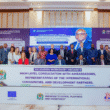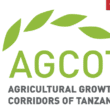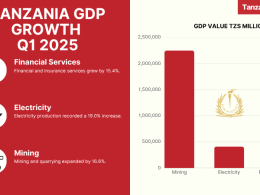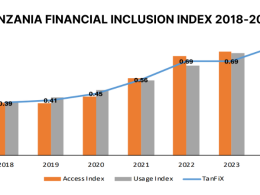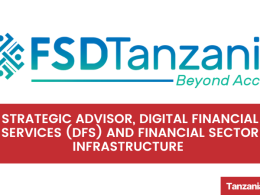TanzaniaInvest conducted an exclusive interview with Frannie Leautier, Chief Executive Office of the recently launched MKOBA private equity fund. MKOBA focuses on investing in African small and medium enterprises. TanzaniaInvest and Mrs. Leautier discuss the rational, the strategy and the ambitions of MKOBA, and the investment opportunities available.
TanzaniaInvest: What’s the origin of MKOBA private equity fund and why such focus on small and medium enterprises, in 8 African countries namely Tanzania, Ivory Coast, Democratic Republic of Congo, Ethiopia, Liberia, Mozambique, Rwanda, Sierra Leone, and South Africa?
Frannie Leautier: MKOBA private equity fund is the realization of a group of executives who came together to fill a perceived gap in the capital available for small and medium enterprises in Africa.
We realize that small and medium enterprises really create the bulk of the jobs in Africa, between 60% and 80%, depending on the country.{xtypo_quote_right}small and medium enterprises really create the bulk of the jobs in Africa, between 60% and 80%.These are the companies that have the hardest time having access to capital{/xtypo_quote_right}These are the companies that have the hardest time having access to capital; even those that have very important niche markets, ideas and opportunities for expansion, because of lack of adequate collateral.
Because the way the banking sector works, the demands for collateral are mostly real estate based, and small and medium enterprises, don’t own much that is capitalized in physical terms.
Microenterprises have no problem accessing capital, because getting ten or thirty thousand dollars, is not difficult. There are many players in micro financing. If you’re a large corporation, you don’t have to worry much, you can access the banking sector with a wide array of instruments.
But there’s this part that we call the missing middle, which are companies that need about one to twenty five million dollars and that’s the hardest to get.
We also noticed that these small and medium enterprises face good governance and management issues. Many of them don’t have accounts, or if they have, they use different accounting systems – one for the taxman, a different one for the banks and a third one for the real business. And being able to understand what’s going on behind those numbers is very difficult.
Finally, these companies that are hungry for capital, but missing either the collateral or the expertise and know-how to make value out of the available finance, are in countries that don’t do well in rankings of where to do business. These indicators just show them in very risky places to do business. But all this withstanding, we know that, there are businesses that can grow, and that have grown.
So our executive team comes with a background from these countries – we were born, raised, grew up, have done business, worked or lived in these countries, whether it’s Ethiopia, Tanzania, Rwanda, Mozambique, Cote D’Ivoire… So we understand the trajectory that businesses take in these environments, and therefore know how to navigate to be successful.
So we decided to create a fund that really goes after these issues that nobody else is looking at, and as first movers, we have certain advantages.
We think we can actually do very good business in these areas and support those companies to do well.
{xtypo_quote_left}Our aim is not only to make a good financial return. We would like that our return to be equally visible in terms of development impact, and in terms of business growth{/xtypo_quote_left}
Our aim is not only to make a good financial return. We would like that our return to be equally visible in terms of development impact, and in terms of business growth.
A very simple logic analysis based on facts showed us that the companies that succeed in these environments are those that add in value to the environment in which they exist.
So, if you are a company that is seen to be providing jobs, to be having positive impacts in terms of innovation, to be successful in transforming peoples’ life, you are also sustainable therefore, because people demand what you do, and therefore you have a chance to grow.
So we won’t do buy-out for buy-out sake. We may buy out a company if it’s an important link to support another company that is delivering value. But not just to buy it and then sell it, make money and move on – that’s not our ethic.
Finally, what makes us different is that there are not that many women in private equity. And there are not many private equity funds that are headed by women. Globally, it’s 7%. Within Africa, it’s almost non-existent. At the same time 43% of small and medium enterprises are women owned, so we have four out of ten chances that the company we invest in will be a woman led company. And so, having women on corporate private equity as part of the partners and leadership, helps us understand the way women do business, and therefore perhaps be more successful in working with them, compared say to other funds that may not have that unique trajectory.
I started my own business and had to balance being a wife, mother and business person, and that takes a certain amount of skill, you go about business in a different way, and that different way is what determines success or failure, and if you understand therefore what may cause such a business to fail, you have a better chance to help it succeed.
In a nutshell, that’s the uniqueness and the motivation behind us starting this fund.
TI: How will you make sure to undergo proper valuations of the companies you invest in, within such challenging environment?
FL: This is a very good question because the weakest link in private equity in Africa today is evaluation. The second weakest link is exit. Our approach to evaluation comes from, first of all, starting with deep local knowledge. Being able to value a company has to start with you knowing the persons who are running the company, owning it, is. So it starts from a very individual level.
{xtypo_quote_right}Our approach […] to value a company has to start with you knowing the persons who are running the company, owning it, is. So it starts from a very individual level{/xtypo_quote_right}
We still have very weak institutions in Africa, and business has grown as a matter of trust, and has not relied on formal systems, which allows you to go to only a certain length in business. In this environment, the book value is meaningless.
So you start valuation of the business by looking at who is the person behind it. There are persons who are good business people and managers, and there are those who are not. We also have techniques, these ring-fenced controls that ensure that when we invest in the business, the investment goes where it ought to go, so we would focus on the procurement for example.
We are able to do that because our executive team is made of individuals with very deep experience in valuation, in emerging markets, which is the field that we are in.
TI: What’s in common among the nine African countries you have chosen to invest in?
FL: These nine african countries share three common features. First, they are amongst the fastest growing economies in the world, not just in Africa. And there’s a reason for that, because they were either in conflict and therefore now the trajectory is up, or their markets were closed, like Tanzania, Ethiopia and Mozambique.
Second, the way in which they go about reforms is very similar. Those that have come out of conflict have a zig-zag approach, depending on political coalitions to move ahead, and we know how that happens because we know those countries – we lived in them, we worked in them. So we can tell you roughly, for our business, what the trajectory is likely to be. So if you invest hoping that a tax regime will change, and it will only change after the next election, because that’s the nature of the country, we would know in advance and don’t bank on that.
Third, because of the high growth coming out of conflict or just opening up, the balance between domestic currency and foreign currency, even in the best macro-economic situation, is sensitive. So being able to structure deals that combine smartly local currency based businesses and revenue streams to those that are impacted by external factors is very key.
{xtypo_quote_left}These nine african countries [in which we invest] share three common features: they are amongst the fastest growing economies in the world, the way in which they go about reforms is very similar and the balance between domestic currency and foreign currency, is sensitive{/xtypo_quote_left}
The reason we included South Africa in our strategy is the Go Africa strategy that is being followed by South African companies. Woolworths is a very good example, a South African company that expanded in Africa, and is now in Tanzania and is planning to go to other countries.
By partnering with Go-Africa, you have natural buyers for your businesses. Also South Africa brings the sophistication of the stock market to exit investments, and finally, as a country itself to invest in.
TI: Is there any sub-sector of the local economies on which you are more focused?
FL: We focus on sectors that create jobs, which are growing because consumer demands grow, and that are uniquely positioned to become regional. This can vary from country to country, that’s why our fund has a wide range of sectors, because in some countries some sectors are hot, in the others, they’re not.
Having said that, there are some sectors that are common to all the countries we have selected. Agriculture, but mostly agro-business and agro-processing is of great interest for us. Then mobile payment systems and cooperatives in the financial services, tourism and hospitality, which is common to all these countries that need to build their tourism sectors and are in high demand. But also urban renewal waste management – water, energy, transport, all those services that are growing because cities are growing.
TI: MKOBA is aiming at raising USD 300 million. How much did you raise so far?
FL: As of now, we have secured a large portion of the $ 150 million we have been committed to for our first close, and are making good progress for expected close by the end of 2014. Then we will raise the other $ 150 million, targeting local investors as well, country by country. For this I think we make a very good argument in terms of why we are different, why we are unique, and that is very attractive to local investors, like pension funds.
{xtypo_quote_right}We invest in business with a local impact, with an exit that can be after 5-7 years. As such the type of investor that is interested in us is patient, because he knows he can make high returns on investment if he stays for longer {/xtypo_quote_right}
We invest in business with a local impact, with an exit that can be after 5-7 years. As such the type of investor that is interested in us is patient, because he knows he can make high returns on investment if he stays for longer, like several multiples higher in returns.
Most private equity firms that I have met, first raise the money, and then look for where to put it. The credibility we have, particularly with local investors, comes from them knowing how we will use the money.
TI: What is MKOBA expected return on investment?
FL: I can tell what we target, an Internal Rate of Return (IRR) of 25%.
{xtypo_quote_left}we target, an Internal Rate of Return of 25%{/xtypo_quote_left}
TI: One last question. MKOBA focuses on nine African emerging economies. Why did you decide to headquarter the fund in Tanzania?
FL: Tanzania is an interesting country from multiple perspectives. First of all, there’s no such fund here, which means that you can get the first mover advantage. Tanzania GDP has been growing for the last twelve years between 6% and 8%. And it’s projected to continue to do that in the next 10-15 years, because of the size of the country, its wealthy in terms of land, natural resources and of course, its population. The economy is highly diversified, so you have mining, gas, agriculture, and services.
The country has also been investing in education in the last decades, so you have more sophisticated cadre of young people who could be employed, and therefore can service these companies that we would invest in.
Tanzania is a country that has opened up and kept stability in its business environment. It may not be the best business environment, but it’s stable. We hope other investors will see these opportunities and come and join us because we think that the focus countries we have would be a good environment to be investing in in the coming years.
The other factor is Tanzania is a country that is linked to many landlocked countries with fast-growing economies, which means regional integration will be key, but so will global integration. If you look at all the financial centers in the world, they have some very common features. Many of them were old ports, linked to the outside world: Amsterdam, London, New York, Singapore… So a country that has that feature, therefore can serve global and regional, as well as national markets. And we think that is very important, because it leaves a huge space in which to innovate and get returns.


